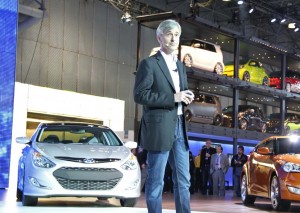Hyundai Motor America plans to be the third automaker to unveil an ultra-clean hydrogen-powered vehicle at this week’s L.A. Auto Show.
Considered by many to be the zero-emission alternative to battery power, hydrogen fuel cell vehicles have been regaining momentum in recent months as manufacturers like Hyundai look to overcome the limitations of current battery technology.
“A fuel-cell car is an electric vehicle for the impatient,” said HMA Chief Executive Officer John Krafcik, who noted the introduction of fuel-cell vehicles will mean that electric propulsion will come in two different “flavors.”
In fact, some proponents refer to fuel cells as “refillable batteries,” as a hydrogen tank can be fueled up in a matter of minutes while batteries can take hours to recharge. That and the longer range offered by hydrogen power are two of the reasons why the technology appears to be regaining momentum.
(Honda offers a sneak peek at its new fuel cell vehicle concept. Click Here for a closer look.)
Fuel cells were the darling of alternative propulsion advocates around the time of the new Millennium before batteries landed in the spotlight. But with electric vehicle sales lagging expectations – and with both manufacturers and government officials taking a renewed look, hydrogen is showing new life.
Along with Hyundai, Toyota and Honda are also unveiling experimental fuel cell cars during the LA show, both makers promising to deliver hydrogen vehicles for limited-volumes sales in the U.S. market by 2015,
(Click Herefor a closer look at Toyota’s new hydrogen car.)
Rapid refueling is seen as a major advantage over battery power, as is range. Toyota is promising its new fuel-cell vehicle, or FCV, will deliver up to 300 miles on a tank – in line with a conventional passenger car – compared to less than 100 miles for the majority of today’s battery-electric vehicles.
The good news is that fuel cells generate electric current that can be used to power the same motor drive system used in a battery vehicle.
“We believe the ultimate form of personal mobility would a hydrogen fuel-cell vehicle,” Honda Motor Co. CEO Takanobu Ito said during a media roundtable in Tokyo.
Automakers have been exploring the potential for hydrogen power for decades. General Motors and Mercedes-Benz, for example, developed early prototypes nearly four decades ago. In fact, the basic concept for a fuel cell dates back more than 150 years, though the technology only found practical application during the Apollo mission, providing power during the long journey to the moon and back.
(White House reverses course, calls for cutting back on biofuels mandate. Click Here for the full story.)
Not everyone is quite so upbeat. Elon Musk, founder of the electric-car maker Tesla Motors, has derided fuel cells as being essentially unsuited for automobiles.
And even proponents like Hyundai’s Krafcik and Honda’s Ito acknowledge there are serious challenges to overcome. Perhaps the most serious is the lack of a hydrogen production and distribution infrastructure – though government agencies in locations as diverse as Tokyo, California and Germany are funding efforts to expand the availability of the ultra-light fuel.
For his part, Hyundai CEO Krafick insisted the maker’s hydrogen show car is not meant to be just a publicity stunt. “This is more than marketing, this is real and we are really excited about it,” Krafcik said.
Krafcik said the discovery of new supplies of natural gas in the US have made fuel cells practical, as one way to create a supply of hydrogen is to extract it from natural gas. As the price of natural gas has come down, fuel cells have begun to look more promising, noted the Hyundai executive, noting how former Secretary of Energy Stepen Chu reversed his initial opposition, ultimately freeing up research funding from the Department of Energy budget.
“This is a very significant time,” Krafcik said, adding that Hyundai will reveal more details about its hydrogen car at the L.A. show.
Paul A. Eisenstein contributed to this report.

